Mike Befeler's Blog, page 59
July 10, 2014
Trying to Fix Something and It Gets Worse
When you try to fix something, do you run into the problem that it gets worse?
This used to happen to me often with plumbing projects. I did them so infrequent6ly that I had to learn all over again when I fixed something. On numerous occasions, I ended up breaking something along the way and had to recoup from that as well as the original problem.
I’m now facing the same thing with slow Internet speed. I called, and the technician speeded up my connection a small amount but recommended I get a new modem, so I purchased a new modem and now the speed is lower than with the old modem. After some dinking, the technician gained me back a little speed, but I’m still worse off than when I started. Now I have to wait for a repair person to come to my house to take a look.
Sigh. The wonders of the modern world.
Published on July 10, 2014 14:30
July 3, 2014
Short Versus Long Chapters in Books
Do you prefer reading books with short or long chapters?
One answer could be: it depends on the genre. Personally, I like reading books with short chapters. You might think that long chapters lead to readers deciding to stay with the story longer at a time and finish the chapter. I’m the other way. If I’m reading a book with short chapters, I’m more apt to read another chapter because it’s short anyway versus getting sleepy and stopping in the middle of a long chapter. And if there is a cliff hanger or an unanswered question at the end of a short chapter, I’ll continue reading rather than feeling I’m going to be trapped in a long chapter.
As a writer, I tend to write short chapters as well, typically five to ten pages. My usual mystery scene is approximately five pages, and I typically have one scene per chapter. If I combine scenes in a chapter, then chapters are closer to ten pages.
One answer could be: it depends on the genre. Personally, I like reading books with short chapters. You might think that long chapters lead to readers deciding to stay with the story longer at a time and finish the chapter. I’m the other way. If I’m reading a book with short chapters, I’m more apt to read another chapter because it’s short anyway versus getting sleepy and stopping in the middle of a long chapter. And if there is a cliff hanger or an unanswered question at the end of a short chapter, I’ll continue reading rather than feeling I’m going to be trapped in a long chapter.
As a writer, I tend to write short chapters as well, typically five to ten pages. My usual mystery scene is approximately five pages, and I typically have one scene per chapter. If I combine scenes in a chapter, then chapters are closer to ten pages.
Published on July 03, 2014 05:00
June 26, 2014
Different Types of Book Editions
I’ve been fortunate to have as many as five different types of book editions for some of my Paul Jacobson Geezer-lit Mystery Series. This includes hardcover, large print, paperback book club edition, audio book and e-book.
As an example for the second book in my series, Living with Your Kids Is Murder, this is the cover for the hardcover and large print editions from Five Star, an imprint of Gale/Cengage Learning:
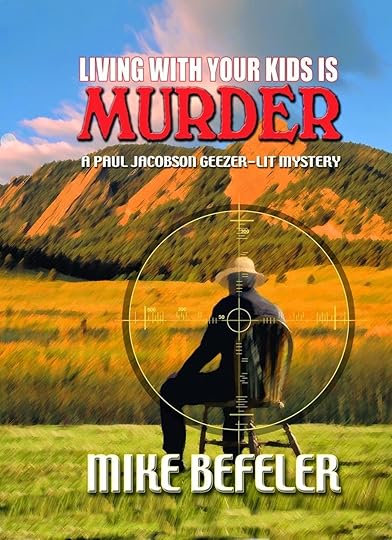
The paperback direct to book club through Worldwide Mystery, an imprint of Harlequin, looks like this:
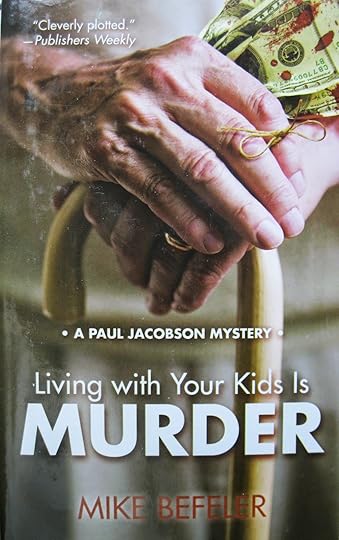
The audio book from Books in Motion has this cover:
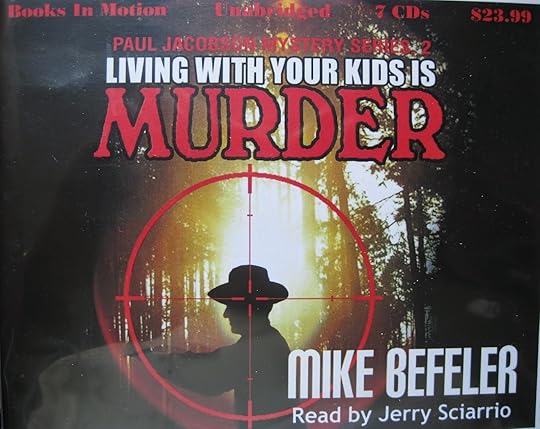
And finally, the e-book edition has this appearance:
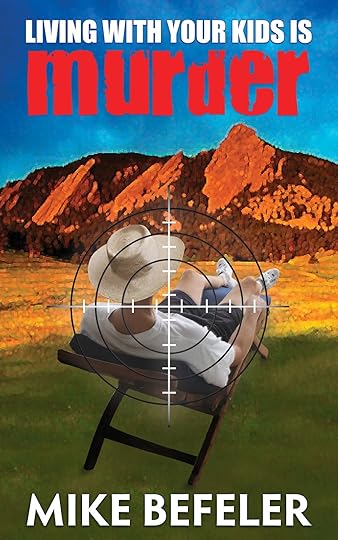
I love that readers have so many different choices when reading my books.
Published on June 26, 2014 05:00
June 19, 2014
Rejection in the World of Writing
One thing is given in the world of writing—rejection. We face a plethora of rejection opportunities from agents, editors, reviewers, readers, and people who posts opinions about books. So I’ve learned to suck it up and accept this as an unpleasant reality.
Even one of the best writers of all time faced the following rotten reviews: “Pure melodrama. There is not a touch of characterization that goes below the skin.,” “It is a play of the worst that ever I heard.” “The most insipid, ridiculous play that I ever saw in my life.”, and “It is a vulgar and barbarous drama. One would imagine this piece to be the work of a drunken savage.” These were reviews of Othello, Romeo and Juliet, A Midsummer Night’s Dream and Hamlet by William Shakespeare.
I have eight published books and two more in the publishing queue, and I still receive rejections from editors and agents as I’m trying to sell my first non-fiction book. Rejection just comes with the territory.
Here’s my advice on rejection. You get a rejection, keep writing. You get another rejection, keep writing, You get another rejection, you keep writing. You get the picture.
Published on June 19, 2014 05:00
June 12, 2014
Nursing Homes Are Murder
The sixth book in my Paul Jacobson Geezer-lit Mystery Series, Nursing Homes Are Murder, has been published. This book takes place in Honolulu right after Paul Jacobson has a winter break vacation with his wife, son, daughter-in-law and granddaughter. Don’t worry that Paul has degraded to the point where he needs to go in a nursing home. On the contrary, he’s asked to go in undercover by the police to help solve a case of sexual assault in a nursing home. When the assault turns into a murder investigation, Paul must muster all his geezer resources to escape from the killer. Along the way Paul makes friends with a member of the 442nd , the Japanese-American regiment that was most decorated in World War II; a woman with synesthesia, a condition where numbers and letters are seen as colors; a soap eater; and a wheelchair racing resident.
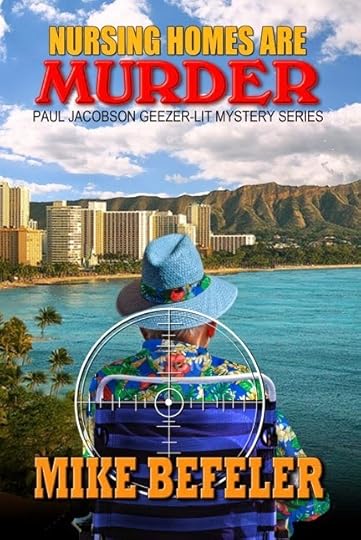
Published on June 12, 2014 05:00
June 5, 2014
Words, Words and More Words
Continuing with my last post, I’ve become fascinated with when words first appeared in the English language and have been using as a source, English Through the Ages, which records when specific words came into common usage. Since I write mystery novels here are a few words that I find interesting.
I have a historical mystery set in 1919 that uses fingerprinting as a clue. Fingerprint was first used as a noun in 1860 and as a verb in 1905. DNA made its appearance in 1935 with DNA fingerprinting in 1985.
The word police came into usage in 1720. Detective and police station appeared in 1845 and private investigator and private eye in 1940.
A few other random words: prisoner of war in 1680 and autism and autistic in 1915.
I could go on forever, but this is today’s sampling.
Published on June 05, 2014 05:00
May 29, 2014
Using Appropriate Words When Writing Historical Novels
I’m just getting into the world of historical novels. My first historical mystery, Murder on the Switzerland Trail, is under contract and is set in Boulder, Colorado, in 1919. I have also written a manuscript for another mystery taking place in the Vatican in 1656. One of the challenges in writing historical novels is using appropriate words for the timeframe.
At a recent meeting of the Rocky Mountain Chapter of Mystery Writers of America, fellow writer Robin Searle told me about a book titled English Through the Ages, which records when specific words came into common usage. This is a wonderful source book and should be in the library of anyone who writes historical novels.
I looked up a few words that I found interesting. Given our world of social media, I checked on the word twitter. It originated as a verb in 1375 and as a noun in 1680. Author first appeared in 1350 and writer’s block was in use by 1950.
As a mystery writer, I checked on a few other words: Murder-725, mystery (in literature)-1910, snitch-1785, hoosegow-1865, stir-1855, copper-1850, cop-1860, hoodlum-1880.
And, of course, since I write geezer-lit mysteries I had to check on the first use of geezer, which goes back to 1885.
At a recent meeting of the Rocky Mountain Chapter of Mystery Writers of America, fellow writer Robin Searle told me about a book titled English Through the Ages, which records when specific words came into common usage. This is a wonderful source book and should be in the library of anyone who writes historical novels.
I looked up a few words that I found interesting. Given our world of social media, I checked on the word twitter. It originated as a verb in 1375 and as a noun in 1680. Author first appeared in 1350 and writer’s block was in use by 1950.
As a mystery writer, I checked on a few other words: Murder-725, mystery (in literature)-1910, snitch-1785, hoosegow-1865, stir-1855, copper-1850, cop-1860, hoodlum-1880.
And, of course, since I write geezer-lit mysteries I had to check on the first use of geezer, which goes back to 1885.
Published on May 29, 2014 05:00
May 22, 2014
Boulder Citizens' Fire Academy continued
This last Saturday we spent the morning at the Boulder Reservoir learning about dive rescue as part of the Boulder Citizens’ Fire Academy. The first exercise involved trying to locate a “drowning person.” A buoy was raised and then hidden again, and we had to triangulate to locate where the “drowning person” had disappeared in the reservoir. We than gave directions to a diver in a flotation suit to get as close as possible to that location. Then the buoy was raised again to see how accurate we were at sighting the correct location.
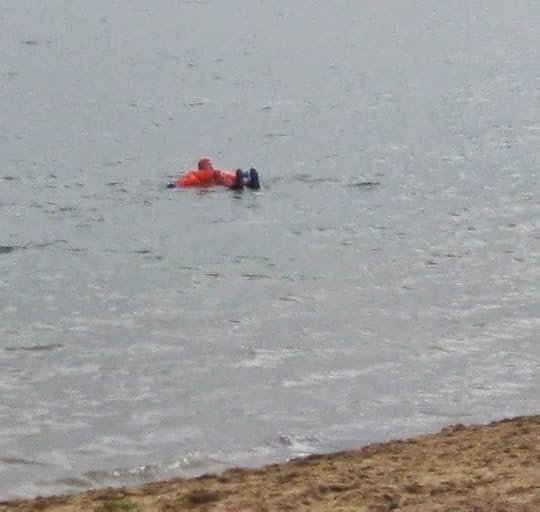
The next exercise was to practice using a banana boat for a stream rescue. Guiding with four ropes we maneuvered the boat as if we were using it in a stream.
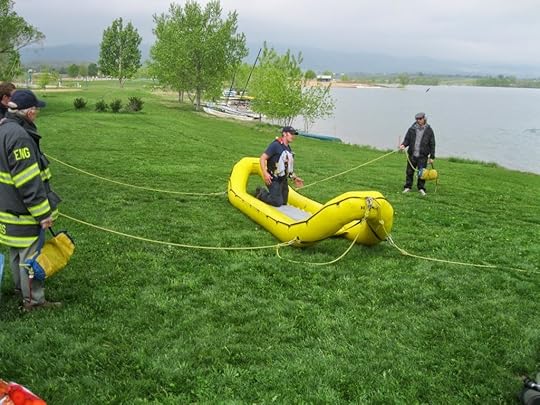
Then we road in a dive rescue boat equipped with sonar to see what we could locate underwater.
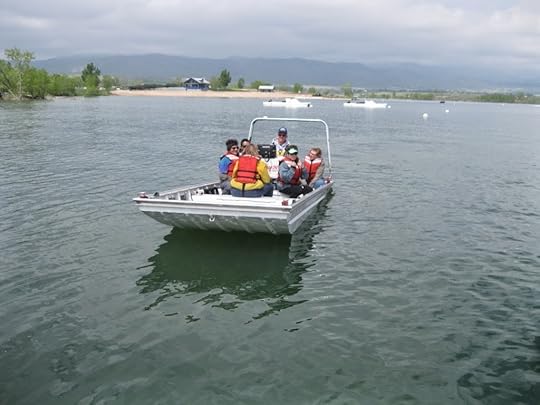
A final exercise was to guide a diver and communicate through a headset to sweep the bottom of the reservoir for a rescue. No body was recovered, but the diver located a number of plastic cups and piece of dock connector. The visibility is a best two feet underwater in the Boulder Reservoir, so the diver needed to sweep using his hands.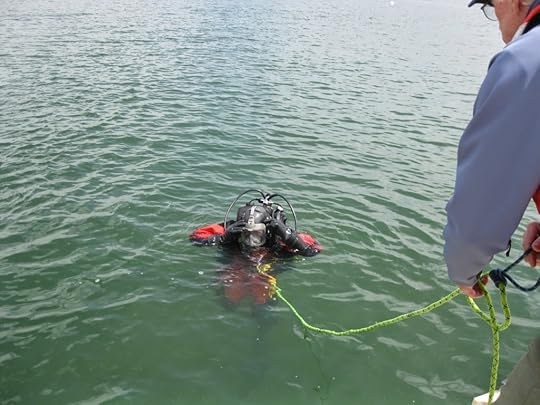
All in all, an interesting day where we gained an appreciation for key elements of dive rescue.

The next exercise was to practice using a banana boat for a stream rescue. Guiding with four ropes we maneuvered the boat as if we were using it in a stream.

Then we road in a dive rescue boat equipped with sonar to see what we could locate underwater.

A final exercise was to guide a diver and communicate through a headset to sweep the bottom of the reservoir for a rescue. No body was recovered, but the diver located a number of plastic cups and piece of dock connector. The visibility is a best two feet underwater in the Boulder Reservoir, so the diver needed to sweep using his hands.

All in all, an interesting day where we gained an appreciation for key elements of dive rescue.
Published on May 22, 2014 05:00
May 15, 2014
World War Two Attrocities
While writing the biography of a World War Two veteran, I keep coming across interesting tidbits. Here's one that caught my interest.During World War Two, both the Germans and Russians were inhumane to their own soldiers who didn’t obey. Those that weren’t shot on the spot were put in penal units. One notorious form of this punishment became known as the tramplers—troops used for suicide missions. In the Russian army, these troops received fortification with a ration of vodka and proceeded to be blown to bits to mark safe passage for the regular troops through the mine fields.
Published on May 15, 2014 05:00
May 8, 2014
Boulder Citizens Fire Academy
For the last five weeks I’ve been attending a citizens fire academy to learn about fire and rescue. Last Saturday we had an all day session at the training facility near the Boulder Reservoir. Here I am in the bunker gear we wore for the day:
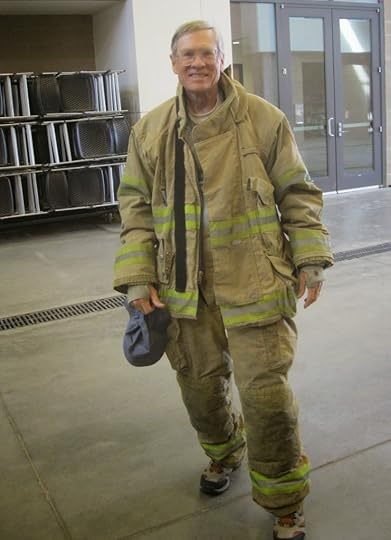
One of the exercises was to you spreaders (jaws of life) and cutters to get into a car to rescue a victim: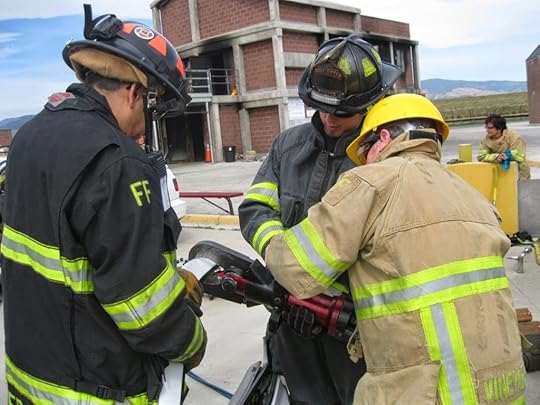
The following pictures shows fire fighters removing a roof after cutting off all the supports: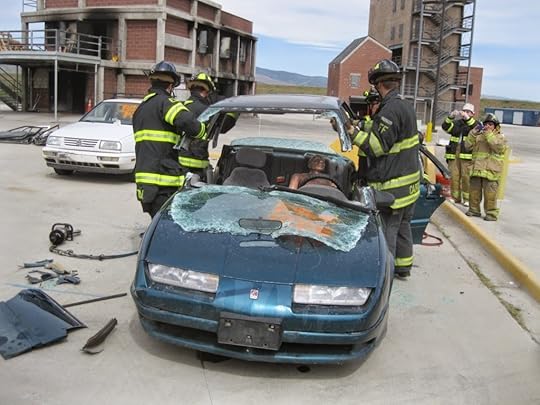
Then we watched a simulated car fire being extinguished and had our chance to handle the hose:
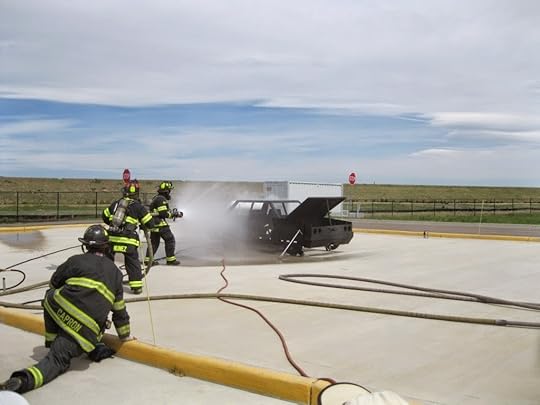
We also had an opportunity to go up in a bucket at the end of a ladder:
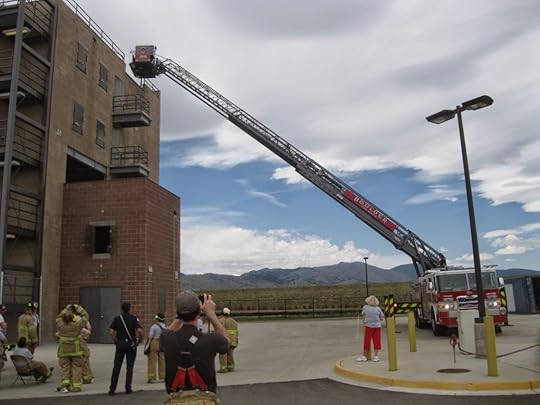
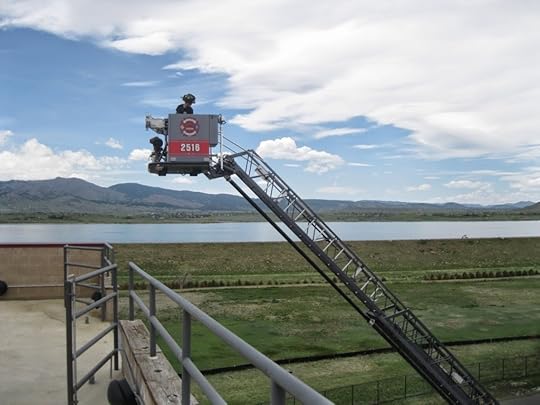 All in all an informative day and useful research for a mystery writer.
All in all an informative day and useful research for a mystery writer.

One of the exercises was to you spreaders (jaws of life) and cutters to get into a car to rescue a victim:

The following pictures shows fire fighters removing a roof after cutting off all the supports:

Then we watched a simulated car fire being extinguished and had our chance to handle the hose:

We also had an opportunity to go up in a bucket at the end of a ladder:

 All in all an informative day and useful research for a mystery writer.
All in all an informative day and useful research for a mystery writer.
Published on May 08, 2014 05:00



